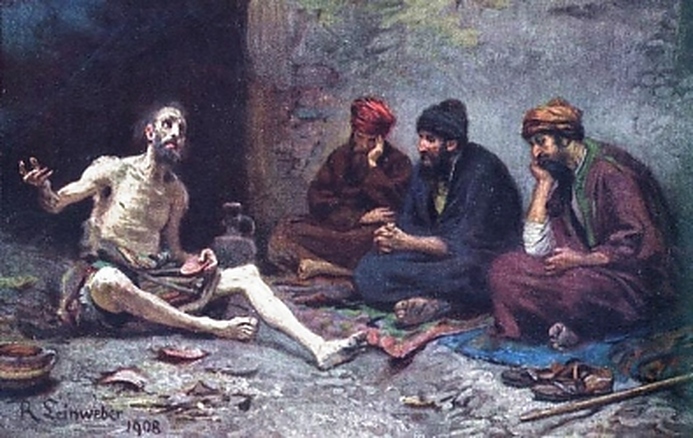Perseverance (The man called job)
Job is a rich man living in a land called Uz with his substantial family and broad runs. He is "chaste" and "upright," constantly watchful to abstain from doing malicious (1:1). One day, Satan ("the Adversary") shows up before God in paradise. God brags to Satan about Job's decency, yet Satan contends that Job is great since God has favored him richly. Satan challenges God that, if offered authorization to rebuff the man, Job will turn and revile God. God enables Satan to torment Job to test this striking case, yet he prohibits Satan to take Job's life all the while.
Over the span of one day, Job gets four messages, each bearing separate news that his domesticated animals, workers, and ten youngsters have all passed on because of pillaging trespassers or regular fiascoes. Employment tears his garments and shaves his head in grieving, however regardless he favors God in his supplications. Satan shows up in paradise once more, and God awards him another opportunity to test Job. This time, Job is burdened with repulsive skin bruises. His better half urges him to revile God and to surrender and bite the dust, however Job cannot, attempting to acknowledge his conditions.
Three of Job's companions, Eliphaz, Bildad, and Zophar, come to visit him, sitting with Job peacefully for seven days keeping in mind his grieving. On the seventh day, Job talks, starting a discussion in which every one of the four men shares his contemplations on Job's torments in long, graceful articulations.
Employment reviles the day he was conceived, contrasting life and demise with light and haziness. He wishes that his introduction to the world had been covered in haziness and yearns to have never been conceived, feeling that light, or life, just heightens his hopelessness. Eliphaz reacts that Job, who has helped other individuals, now demonstrates that he never extremely comprehended their agony. Eliphaz trusts that Job's distress must be because of some wrongdoing Job has conferred, and he encourages Job to look for God's support. Bildad and Zophar concur that Job more likely than not conferred wickedness to insult God's equity and contend that he should endeavor to display more faultless conduct. Bildad derives that Job's kids brought their passings upon themselves. Far and away more terrible, Zophar suggests that whatever wrong Job has done most likely merits more prominent discipline than what he has gotten.
Job reacts to every one of these comments, developing so disturbed that he calls his companions "useless doctors" who "whitewash [their advice] with lies" (13:4). In the wake of influencing torments to attest his irreproachable character, To work considers man's relationship to God. He asks why God judges individuals by their activities if God can simply change or excuse their conduct. It is additionally misty to Job how a human can mollify or court God's equity. God is inconspicuous, and his ways are enigmatic and outside human ability to comprehend. In addition, people can't in any way, shape or form influence God with their words. God can't be tricked, and Job concedes that he doesn't comprehend himself all around ok to viably argue his case to God. Job wishes for somebody who can intervene amongst himself and God, or for God to send him to Sheol, the profound place of the dead.
Employment's companions are annoyed that he hates their shrewdness. They think his inquiries are tricky and do not have a fitting apprehension of God, and they utilize numerous analogies and representations to emphasize their continuous point that no good thing happens to mischievousness. Employment maintains his trust regardless of these reactions, reacting that regardless of whether he has done fiendishness, it is his very own concern. Moreover, he trusts that there is a "witness" or a "Deliverer" in paradise who will vouch for his purity (16:19, 19:25). Sooner or later, the criticizing demonstrates excessively for Job, and he becomes snide, fretful, and anxious. He regrets the foul play that God gives fiendish individuals a chance to thrive while he and innumerable other pure individuals endure. Job needs to go up against God and gripe, however he can't physically discover God to do it. He feels that insight is escaped human personalities, however he takes steps to persevere in seeking after intelligence by dreading God and keeping away from underhanded.
Without incitement, another companion, Elihu, abruptly enters the discussion. The youthful Elihu trusts that Job has spent excessively vitality vindicating himself instead of God. Elihu discloses to Job that God speaks with people by two ways—dreams and physical agony. He says that physical enduring gives the sufferer a chance to understand God's adoration and absolution when he is well once more, understanding that God has "emancipated" him from an approaching passing (33:24). Elihu additionally expect that Job must be mischievous to endure as he seems to be, and he imagines that Job's inordinate talking is a demonstration of disobedience to God.
God at last intrudes on, calling from a tornado and requesting Job to be overcome and react to his inquiries. God's inquiries are explanatory, proposing to demonstrate how little Job thinks about creation and how much power God alone has. God depicts numerous itemized parts of his creation, adulating particularly his production of two substantial mammoths, the Behemoth and Leviathan. Overpowered by the experience, Job recognizes God's boundless power and concedes the impediments of his human learning. This reaction satisfies God, yet he is angry with Eliphaz, Bildad, and Zophar for gushing poor and religiously unsound exhortation. Occupation mediates for their benefit, and God pardons them. God restores Job's wellbeing, giving him twice as much property as previously, new youngsters, and a greatly long life.

.jpg)

.jpg)
Congratulations @adosimena! You have completed some achievement on Steemit and have been rewarded with new badge(s) :
Click on any badge to view your own Board of Honor on SteemitBoard.
For more information about SteemitBoard, click here
If you no longer want to receive notifications, reply to this comment with the word
STOPThis story teaches us a lot, as a Christian our faith is everything